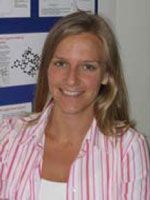Preview of ACS Division of Analytical Chemistry Award for Young Investigator in Separation Science Award
For a young scientist, being recognized for your hard work at such an early stage in your career is a tremendous honor.

Mary Elizabeth WilliamsFor a young scientist, being recognized for your hard work at such an early stage in your career is a tremendous honor. Young such scientist is Mary Elizabeth Williams, who will receive the 2007 Young Investigator award Wednesday morning at Pittcon. She is an Assistant Professor of Chemistry at the Pennsylvania State University, who received her PhD from the University of North Carolina followed by postdoctoral work at Northwestern University.
Her research interests are widespread, including inorganic DNA - the study of artificial oligopeptide scaffolds linked by metal ions; inorganic enzymes - the metal binding of artificial oligopeptides for designer bioaffinity and reactivity; selective transport of inorganic nanoparticles - synthesizing chemically functional inorganic nanoparticles whose transport may be manipulated and controlled via their magnetic properties; and visualizing, patterning, and directing motor proteins with nanoparticles.
Professor Williams is a member of the American Association for the Advancement of Science, the American Chemical Society, the Materials Research Society, the Electrochemical Society, and the Society for Electroanalytical Chemistry. She has previously been the recipient of several awards, including the Charles N. Reilley Graduate Award (1994), the University of North Carolina Department of Chemistry Dobbins Award (1996), the Union Carbide Kenan Analytical Award (1998), the National Science Foundation Faculty Early Career Development Award (2002), and the 3M Nontenured Faculty Award (2006).
The Young Investigator Award is presented annually for research on advanced functional electrode materials and new microscopic tools for their characterization by the Society for Electroanalytical Chemistry (SEAC).
LCGC’s Year in Review: Highlights in Liquid Chromatography
December 20th 2024This collection of technical articles, interviews, and news pieces delves into the latest innovations in LC methods, including advance in high performance liquid chromatography (HPLC), ultrahigh-pressure liquid chromatography (UHPLC), liquid chromatography–mass spectrometry (LC–MS), and multidimensional LC.
Next Generation Peak Fitting for Separations
December 11th 2024Separation scientists frequently encounter critical pairs that are difficult to separate in a complex mixture. To save time and expensive solvents, an effective alternative to conventional screening protocols or mathematical peak width reduction is called iterative curve fitting.